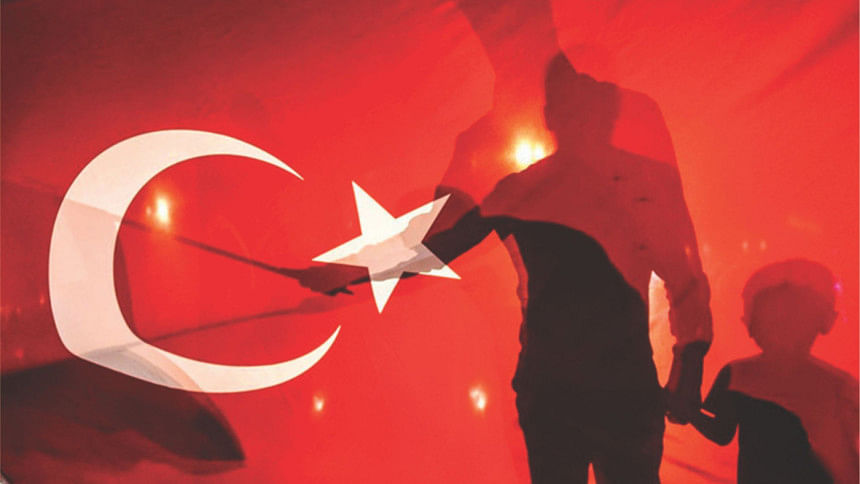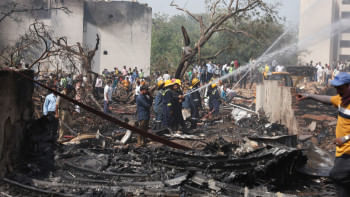With skates on, Turkey could slip into Syrian quagmire

Hakan Fidan, Chief of Turkish Intelligence, did not give much credence to warnings by Russian agencies that a coup to oust President Tayyip Erdogan was in the works. But he shared the information with others on a "need-to-know" basis. In a manner of speaking, he closed the door, a sort of general precaution. He did not send out an alert.
The Russians persisted. A helicopter gunship would target Erdogan at his Mediterranean holiday resort.
Subsequent stories remain unverified – that Erdogan could not land at Istanbul, Germany, Azerbaijan. That is when the Americans gave him refuge at the Incirlik air base which, ironically, happens to be in Turkey. Then Fethullah Gulen surfaced as the master plotter, in cahoots with "some" American Generals.
Obviously the Russians had their ears close to the ground when they picked up the earliest signals of the impending coup. When Erdogan called out the people to thwart the plotters, Tehran was the first capital to openly support the embattled Turkish president. Suddenly, Moscow, Tehran, Hezbullah in Lebanon, Iraq - particularly Najaf, because Prime Minister Haider al Abadi in Baghdad is seen as something of an American puppet – all of them had broad smiles on their faces.
With athletic agility, Erdogan turned up at St. Petersburg, apologised for the Russian pilot being shot down over Turkey in November, 2015, and locked Vladimir Putin in a tight embrace.
And, lo and behold, Turkish forces are now in Syria, tanks and all. Is the theory of unintended consequences catching up with everybody after the failed coup of July 15? I mention this because I have been witness to another botched up coup which changed the world – The Saur (April) 1978 revolution which brought the Afghan Communist Parties, Khalq and Parcham to power. This paved the way for the Soviet occupation of Afghanistan in 1980. I remember a panic stricken Zbigniew Brzezinski, President Carter's National Security Adviser on the Pakistan-Afghan border, discussing strategies.
Let me first explain how it was a "botched" up coup.
Having suffered reverses in Vietnam, Angola, Mozambique, Ethiopia, Nicaragua at the hands of local communist movements, the Americans pressured the Shah of Iran's Savak Secret Service to oust the Left in Kabul which was getting powerful around President Daoud Khan.
When the coup plan was still in its nascent stages, Mir Akbar Khybar, a trade union leader, affiliated to Parcham, was killed in an intelligence-counter intelligence mix up. The coup plot had leaked. Abdul Qadir and Aslam Watanjar, Communist moles in the Afghan Armed Forces, drove out tanks from Pul e Charkhi. They slaughtered Daoud and his entourage.
The Left, unprepared for power, persuaded Nur Mohammad Taraki of Khalq to take over as Prime Minister. Within two years, the Soviets were in Afghanistan.
The US, Saudis, Pakistan, for their own reasons, got into a scrum. Thus, began the training of Mujahideen in hundreds of Madrasas along the border with Afghanistan. The strategy was to play on Islamic aversion to "Godless" communism. The trick, bolstered by stinger missiles, worked.
After 1981, President Reagan had raised the cost of the Cold War for the Soviet Union everywhere, including Afghanistan. By 1989, the new Secretary General of CPSU, Mikhail Gorbachev, began withdrawing Soviet troops. Then, the Berlin wall fell. By 1991, the Soviet Union had come down like melting ice cream.
Two comparisons with the situation in Turkey and Afghanistan are possible. It was a botched up coup in Afghanistan in 1978 which changed the world. The consequences plague us to this day. Witness the ghastly attack on the American University in Kabul this week. Likewise, the botched up coup in Turkey has brought about strategically new power equations globally as well as regionally.
The other comparison, to which Syrians are subscribing, is plausible: Soviet Union hurtled headlong into Afghanistan and came out irreparably broken. Might Erdogan likewise be leading Turkey inextricably into the Syrian quagmire?
The omens are not good. For the past five years, every country in the Syrian theatre – the US, France, Saudi Arabia, Qatar, Turkey, Jordan – has been supporting either "moderates" opposed to Bashar al Assad or extremists like Jumat al Nussra in pursuit of the same end. Each side has other game plans which are played out as subsidiary side shows. These are too many to be listed.
Americans occupied Iraq for a decade, dismantled all its institutions and left in 2011, more or less empty handed. Which is why they had to remove Premier Nouri al Maliki, who had dedicated himself exclusively to the expansion of his Shia base. The Saudis next door were throwing fits. Americans needed influence in Baghdad. Little wonder Prime Minister Haider al Abadi is their man.
With such experience in Iraq, how did the Americans (and their cohorts) imagine that mere cross border terrorism – albeit, lethally armed – would topple Assad? After all the Baathist structure in Syria is the mirror image of the one in Iraq. Assad is a non practicing Alawi just as Saddam Hussain was only a notional Sunni. Except for public rituals, both must be listed as devout atheists.
The impression now being put out is that Erdogan's primary aim for entering Syria is to prevent Syrian Kurds carving out territory along the Turkish border. That would feed Turkish Kurd party, the PKK's quest for separation. Erdogan's purpose last year was different: he was facilitating ISIS's oil trade across the border. In brief, everybody in the Syrian war was everybody else's proxy. Erdogan was a major player in this game of surreptitious intent.
Will the terms of endearment now change totally just because Erdogan kissed Putin on both his cheeks in St. Petersburg?
A new pirouette has begun in Syria. Only after the US elections will it become clear who is on the dance floor and who is sinking in a quagmire.
The writer is a senior Indian journalist, television commentator and interviewer.

 For all latest news, follow The Daily Star's Google News channel.
For all latest news, follow The Daily Star's Google News channel. 



Comments